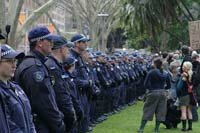22 November 2008
APEC protest first-hand
28 September 2007
By Sam Stewart
 |
As the hype of Sydney’s recent Asia Pacific Economic Cooperation (APEC) conference dies down, individual stories begin to emerge from the 10,000-strong protestors that demonstrated during the eight-day summit.
Ian Rintoul is the founding member of the Queensland-based Refugee Action Coalition. He travelled to Sydney specifically to protest at the conference.
Weeks before the event Rintoul was told by the Federal Police that he was on the Government’s ‘declared list’.
He was told if he entered designated declared zones around the city he would be arrested immediately.
“It didn’t surprise me that I had been added to the list. The Government tried a few tactics to keep people away — it just fuelled the fire,” he says.
Rintoul was not told why he was put on the list, but he was not the only one warned about attending protests.
“I know of people who had letters sent to them, were phoned and even approached leaving the pub by federal police. They were told not to get involved in APEC or there would be dire consequences.”
Just what the consequences were was also never specified but they did not stop thousands of people turning out to show their disapproval of the event.
Police reinforcements
To combat the mobs of protestors, 3000 police and army troops were recruited to keep the peace.
Private citizens were asked to be police spies and police were given extra powers in declared zones, says Rintoul, who believes this escalated the tension.
“APEC was so hyped up by the Government and police talking about the scale of violence that was going to occur that it got the police whipped into a frenzy,” he says.
Rintoul and nine others were arrested in what he describes as an unprovoked situation.
“It was totally unnecessary. A small group of us were having a meeting in the park after the protest and it ended in nine of us getting arrested.”
Rintoul, along with most of the others, was released without conviction three hours later, but two of the group were charged.
The protests had a “festival” feeling, he says.
The police presence, however, “could only be compared to the (1981) Springbok tour to New Zealand”.
The police presence and the protests took away from what Prime Minister John Howard was trying to achieve, says Rintoul.
“Howard wanted to use [APEC] as a way to parade around with Bush but the emphasis they put on the protests during the build-up and the reality of how peaceful we were overshadowed the whole event.”


